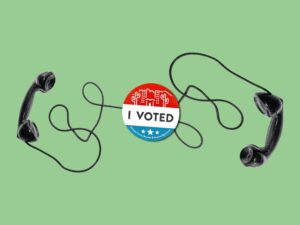Georgetown students who aren’t voting in their home state have the opportunity to join fellow D.C. residents in voting in the general election until Nov. 8. Despite not having the ability to choose voting members in Congress, voters in D.C. must navigate highly consequential elections to local offices, particularly as the District manages a nearly $20 billion annual budget that impacts almost 700,000 people— the largest per capita of any city in the nation–to spend on critical issues such as housing, education, and public safety.
Non-voting congressional representation
At the top of the ballot is the election for D.C.’s non-voting delegate to the United States House of Representatives, with incumbent Eleanor Holmes Norton (D) seeking her 17th consecutive term in office. She is being challenged by Nelson Rimensnyder (R), as well as Bruce Majors and Natale Stracuzzi, the Libertarian and D.C. Statehood Green party candidates, respectively.
Norton, who has served in the position since 1991, seeks to continue her career objective to enact D.C. statehood through congressional legislation, with opponents pointing toward her long tenure in the position with little progress on statehood as evidence that a fresh face is needed for D.C. representation in Congress.
The citywide ballot also includes the race for the Shadow United States Representative from D.C., an office which is not officially seated in Congress, where incumbent Oye Owolewa (D) faces Joyce Robinson-Paul of the D.C. Statehood Green Party in the race to fill the position primarily tasked with lobbying Congress for D.C. statehood.
D.C. Mayor
The race for D.C. Mayor, the highest executive office in the District, is next on the ballot with incumbent Muriel Bowser (D) seeking her third term in office. Bowser is looking to continue her mandate to invest in affordable housing and reduce houselessness in the District, as well as to continue her advocacy for D.C. statehood from the District’s most powerful office, although some of her opponents critique her approach to policing and the success of her housing initiatives. She is being challenged by Stacia Hall (R), as well as Libertarian Dennis Sobin and independent Rodney “Red” Grant.
The June democratic primary has reaffirmed the District’s commitment to being a predominantly blue city—with a population that is nearly 76 percent democratic, the primary is often the deciding election for many of the District’s candidates, including Norton and Bowser, who seem poised to win re-election on Nov. 8.
D.C. City Council
The at-large race for the two seats on the D.C. city council is probably the most competitive election within the general election. Graham McLaughlin, a healthcare equity business executive and an independent candidate in the at-large race, wrote in an email to the Voice about the election’s competitive nature.
“The at-large race is competitive since it is mandated that a non-majority party wins at least one seat,” McLaughlin wrote. “What’s interesting is there are multiple candidates that could win the two seats, so this election will come down to critical votes.”
The uniquely competitive nature of the at-large race originates from the District’s lack of statehood and the D.C. Home Rule Act of 1973, which was passed by Congress and outlines the District’s governing institutions. The act made it so that each party could only nominate one candidate in an at-large election, meaning that the typically-dominant Democrats can only nominate one candidate in the two-seat election, making the race competitive beyond the primary and into the general election.
McLaughlin is joined by seven other candidates, making for a total of eight candidates running for the two available seats, including three currently-seated D.C. council members. Incumbents Anita Bonds (D), who has held an at-large seat on the D.C. City Council since 2012, and Elissa Silverman (I), who has held an at-large seat since 2015, are also joined in candidacy by Kenyan McDuffie (I), who has represented Ward 5 in the D.C. Council since 2012 but is running for an at-large seat in this election.
“It’s an election with significant contrast—you have three long-term incumbents who have served a total of over 25 years, and then you have new change candidates like myself,” McLaughlin wrote, highlighting his outsider status compared to Bonds, Silverman, and McDuffie.
Karim D. Marshall, an attorney with a decade of experience in D.C. government, as well as Fred Hill, a businessman who formerly worked at the D.C. Department of Housing and Community Development, are both running as independents in the election as well. Giuseppe Niosi (R) and activist David Schwartzman of the D.C. Statehood Green Party finish off the list of candidates running for the two seats.
Initiative 82
The ballot also includes a vote on Initiative 82—a D.C. council proposal that would raise the minimum wage for tipped staff in the District up to the standard minimum wage, $16.10, by 2027.
I’m a Georgetown student. How can I vote?
Georgetown students who live on and off campus in the District are eligible to vote in the election as residents of D.C., provided they have not voted in their home state, and can complete same-day registration at any voting place with a valid proof of address, such as a university housing statement. These statements can be requested through Residential Living.
On Election Day, Nov. 8, there will be nine locations in Ward 2 open for voting from 7:00 a.m. to 8:00 p.m.







Wow Henry Skarecky! Great Article! Keep it up proud of you.